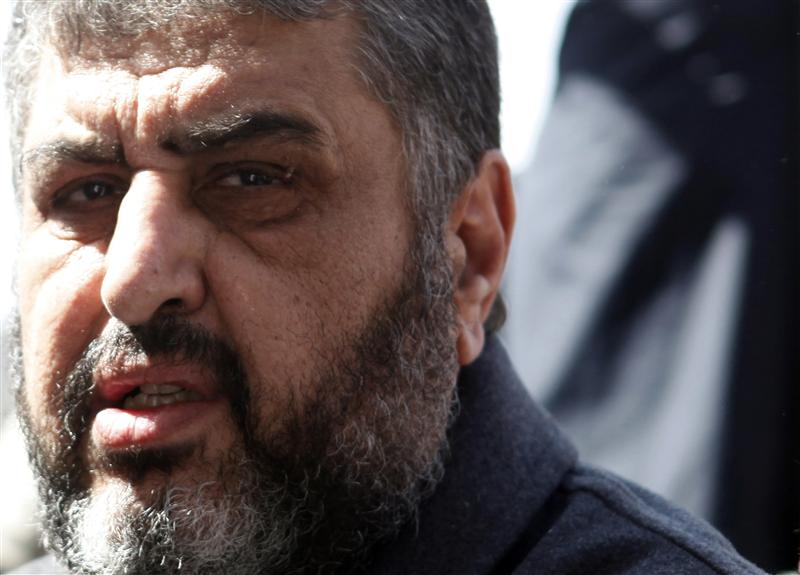Latest NEWS
- Aswat Masriya, the last word
- Roundup of Egypt's press headlines on March 15, 2017
- Roundup of Egypt's press headlines on March 14, 2017
- Former Egyptian President Hosni Mubarak to be released: lawyer
- Roundup of Egypt's press headlines on March 13, 2017
- Egypt's capital set to grow by half a million in 2017
- Egypt's wheat reserves to double with start of harvest -supply min
- Roundup of Egypt's press headlines on March 12, 2017
Debate over Muslim Brotherhood candidate

Presidential candidate, Khairat Al-Shater - Mohamed AbdelGhani/REUTERS
Debates erupted when the Muslim Brotherhood (MB) announced its nomination of deputy leader Khairat Al-Shater for presidency, where Islamists fear the dispersion of votes in favor of a liberal candidate, and liberals fear Islamist domination.
Initial opposition to Al-Shater’s nomination emerged from within the Brotherhood, where Kamal Al-Halabawi, former official MB spokesperson, announced his resignation live on a satellite channel, condemning what he described as "lies" and "attempts to unrightfully claim power".
Al-Halabawi insisted that the Brotherhood’s conduct resembles that of the dissolved National Democratic Party where the mess is incomparable to that of any other era, including times when MB members were widely detained.
The Muslim Brotherhood announced their decision at a press conference on Saturday evening after gaining the majority agreement of their Shura (advisory council) where 56 out of 108 votes were in favor of the decision.
Meanwhile, Mohamed Morsi, head of the Freedom and Justice Party, suggested that the decision was reached under consensus between the Brotherhood and its political wing, where they are ready to bear responsibility for its consequences.
MB leader, Mohamed Habib, condemned the decision, considering it one of the many mistakes committed by the Brotherhood recently. Habib explained that his objection mainly revolves around the fact that Al-Shater is a businessman. "It is not logical for post-revolution Egypt, which toppled businessmen rule, to bring a businessman to power", he said, suggesting that Al-Shater is the consensual president of the MB and the ruling military.
Liberal forces have not yet issued official reactions to Al-Shater’s nomination.
Refaat Al-Saeed, head of Al-Tagmoaa Party, described the MB's decision as "dark comedy", indicating that the nomination is an attempt to polarize power which naturally spurs fear among Egyptians, forcing them to wonder where Egypt is heading, reported Al-Shorouk.
Wafd Member of Parliament, Hosni Hafez, argued that although the MB enjoy the right to nominate a presidential candidate, their decision demonstrates change in directions, especially after they refused to support former MB member Abdel Moneim Aboul Fotouh. Hafez stressed on the irony of electing a businessman when the former government was despised and toppled for being dominated by businessmen, reported Al-Ahram newspaper.
The Brotherhood had initially announced that they would not field a candidate for president, and suspended Abdel Moneim Aboul Fotouh when he defied that decision by announcing his intention to run.
Meanwhile, Ahmed Maher from the April 6 movement argued that the decision to nominate Khairat Al-Shater indicates dispute and divisions within the Brotherhood over backing Hazem Salah Abu Ismail and Abdel Moneim Aboul Fotouh.
Political activist Kareema Al-Hefnawi believes that the Muslim Brotherhood does not consider parliament and constituent assembly enough and thus aspire for presidency as well. She indicated that the Brotherhood’s decision to retreat on their initial stance is an indication that the dispute with the ruling military has reached its peak.
Meanwhile, Yasser Saif Amin, head of the Ahrar Al-Desturyeen Party (under construction), argued that the decision is an attempt to disperse votes between Abu Ismail and Al-Shater in favor of a candidate who is yet to appear on the political scene.
Al-Shater was arrested in 2006 along with other MB leaders and convicted of involvement in international scheming. He was jailed in 2007 for providing students with weapons and military training and released in 2011.
It is worth mentioning that Al-Shater’s daughter was reportedly shocked to hear the news of her father's nomination, describing it as "disaster".










